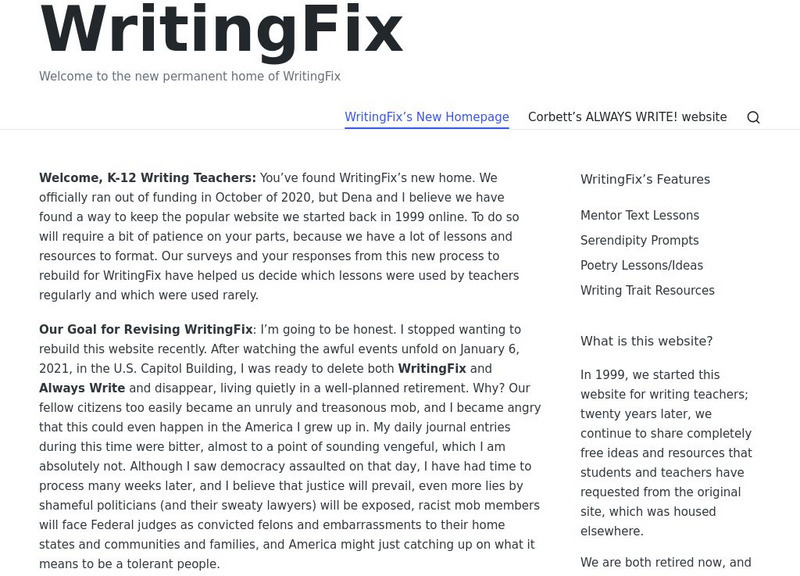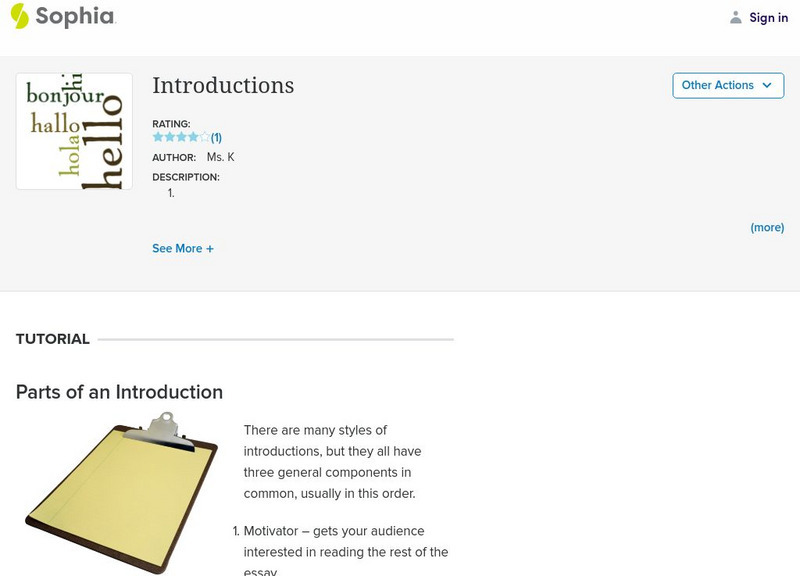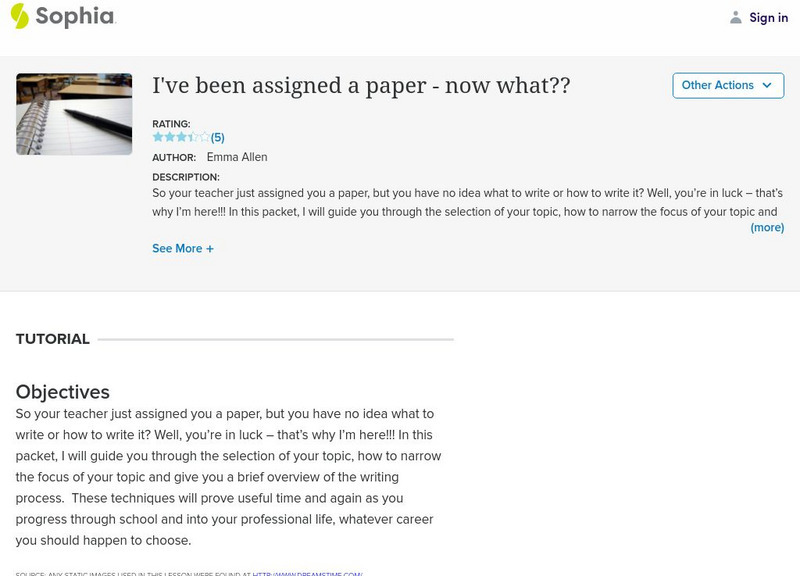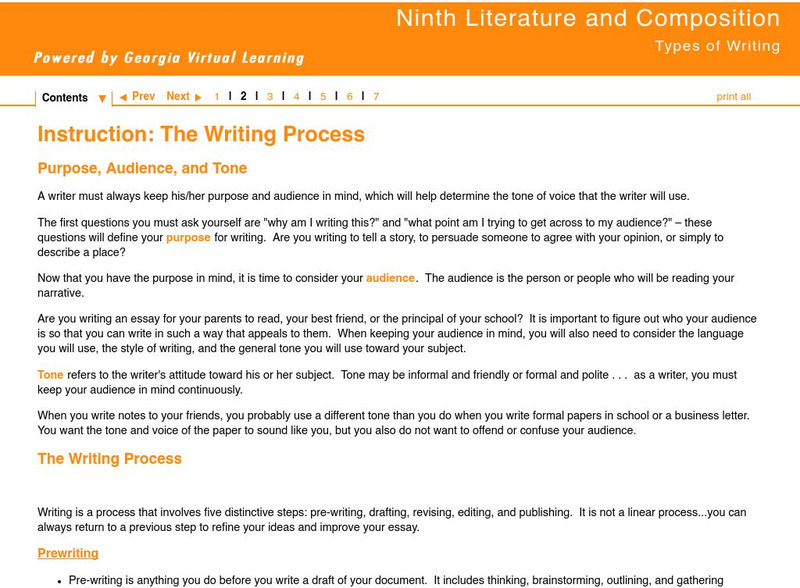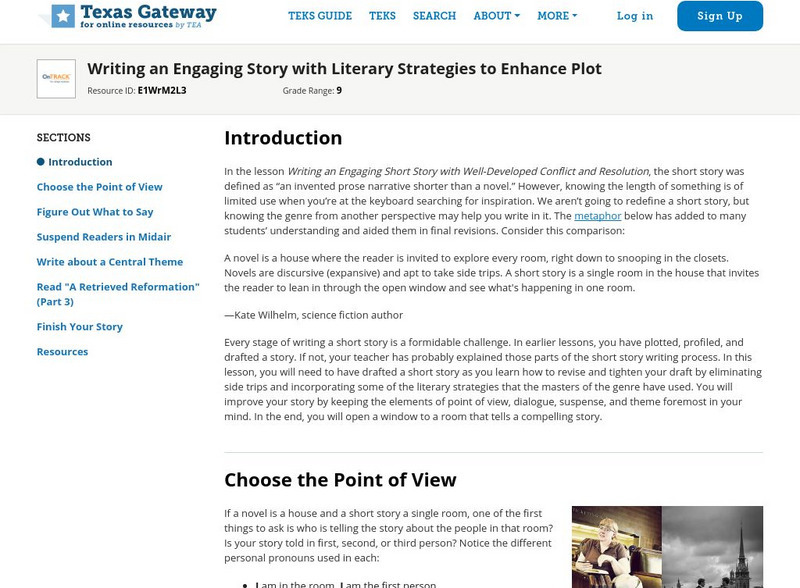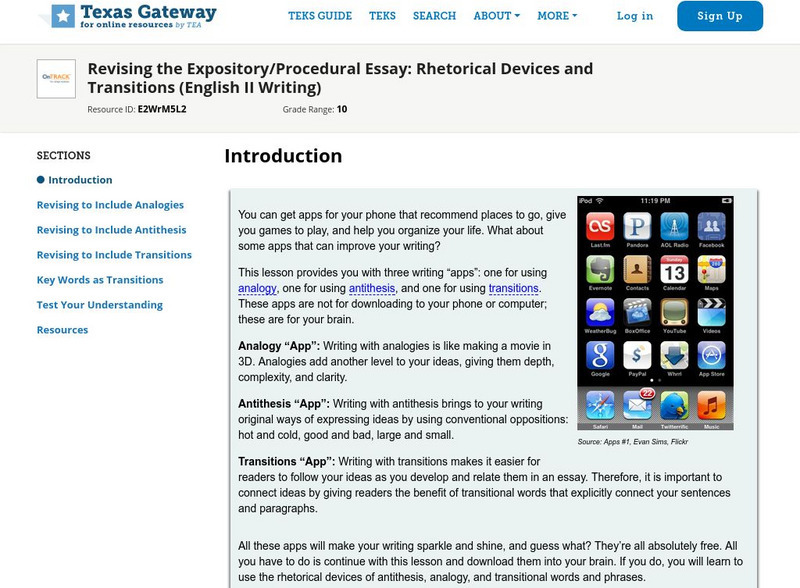Curated OER
Centers of the Storm: The Lyceum and the Circle at the University of Mississippi
Greek Revival architecture and the Civil Rights Movement? Sure! Examine how the Lyceum and Circle, two historic buildings located on the campus of the University of Mississippi, relate to integration and the 1962 riot on the university...
Poets.org
Ghosts and Spirits
Connect poetry to a naturally kid-friendly topic: ghosts! Draw on your class's prior knowledge of the paranormal to help them access the classic poem "Haunted House" by Henry Wadsworth Longfellow. After a fun warm-up activity describing...
Curated OER
Show, Don't Tell: The First Rule of Writing
Model for young writers how to create pictures in the minds of readers with a series of slides that demonstrate how sensory appeals enliven writing. The presentation includes opportunities for viewers to practice showing writing.
Curated OER
Narrative Nuts and Bolts
After viewing slides and reading about child labor, young authors compose an original narrative story. They practice note-taking skills and work to effectively engage a reader by incorporating plot, logical order, complex characters,...
National Endowment for the Humanities
Thirteen Ways of Reading a Modernist Poem
High schoolers analyze modernist poetry and the role of speaker in example poems. Learners study modernist poems from the Romanticism and Victorian periods as well as Wallace Stevens' "Thirteen Ways of Looking at a Blackbird." Using a...
Curated OER
Video Biographies
Who was Alexander The Great? How did Abraham Lincoln’s early life influence his political life? Learners select a historical figure to use for video biography. After developing research questions and collecting information, pupils search...
Curated OER
Ancient Cultures News Broadcast
How does geography influence daily life? Guided by an essential question, class groups select and then research an ancient culture, and develop a news broadcast about the geographical setting and its impact on the culture. Teams...
John F. Kennedy Center
Acting Up, A Melodrama: Performing Like Jo March and Her Sisters in Little Women
Lights, Camera, Action! Pupils read Little Women and create, act, and direct a melodrama that Jo March and her sisters would enjoy. The lesson plan comes complete with resources for the educator on melodrama as well as examples...
Curated OER
Acting Like a Bunch of Animals: Fables and Human
The video "The Tales of Aesop" traces for viewers the history of fables and identifies their characteristics. The class then goes to the web site "The Fisherman and the Little Fish" where they examine the classic and a modern version of...
Georgia Department of Education
Ga Virtual Learning: Nonfiction and Research: Creating and Using Outlines [Pdf]
This is the three-page PDF The Quality Writing Center: "Creating and Using Outlines." It explains and provides examples of what to do before starting the outline, working thesis, defining purpose, the types of outlines, creating the...
Writing Fix
Writing Fix: Showing Creative Problem Solving
After reading excerpts in which Buck solves a problem in Jack London's The Call of the Wild, students write their own three-paragraph animal stories imitating London's style and word choice. Teacher and student instructions are provided...
Other
Writing for Audio Theatre: Radio Drama Script Template
Great site if you want to learn how to write a radio drama sketch. The site offers lots of examples and pointers for the beginner. W.9-10.3a Narrative Intro, W.11-12.3a Narratives
Georgia Department of Education
Ga Virtual Learning: Ninth Literature and Composition
This is an introduction to a unit on writing in various genre including Nonfiction, Narrative, Literary Writing, Short Stories, and Poetry. Analysis of "The Odyssey", "To Kill a Mockingbird", "Romeo and Juliet". Click on the View links...
Georgia Department of Education
Ga Virtual Learning: Ninth Lit and Composition: Types of Writing Instruction
This lesson focuses on the four types of writing: narrative, descriptive, expository, and persuasive including definition and characteristics of each and an interactive activity over they types. It also provides links to more information...
Georgia Department of Education
Ga Virtual Learning:ninth Grade Lit and Comp: Introduction to Personal Narrative
This lesson is an introduction to a unit on personal narratives including the characteristics of a personal narrative: tells a story, events are in chronological order, and it has characters, setting, and plot. Click next at the bottom...
Georgia Department of Education
Ga Virtual Learning: Ninth Literature and Composition: Short Stories
This lesson provides and introduction to a short story unit. It focuses the lessons and morals taught by short stories and the use of literary elements in fiction. I provides a list of essential questions.
Georgia Department of Education
Ga Virtual Learning: Types of Writing: Expository and Persuasive
This lesson introduces two types of writing: expository and persuasive. It defines and provides examples of each kind. It offers links to MLA Formatting and Style Guide and sample papers of opinion and exository essays.
TeachEngineering
Teach Engineering: It Takes Two to Tangle
Students explore the theme of conflict in literature. They learn the difference between internal and external conflict and various types of conflicts, including self against self, self against other, and self against nature or machine....
Sophia Learning
Sophia: Introductions
This tutorial focuses on introductions; it lists and explains three common components of introductions: motivator, thesis, and blueprint. It provides a sample introduction with commentary showing each of the parts. It discusses the...
Sophia Learning
Sophia: I've Been Assigned a Paper, Now What?
This tutorial focuses on selecting and narrowing a topic for a literary paper. It offers a flow chart of the writing process and two videos brainstorming topics using a web-style graphic organizer for each of two novels: "To Kill a...
Georgia Department of Education
Ga Virtual Learning: Ninth Lit and Comp: Types of Writing: The Writing Process
This lesson focuses on the writing process including understanding purpose, audience, and tone and the parts of the writing process: prewriting, drafting, revising, editing, and publishing.
Peace Corps
Peace Corps: Narrative Cartoons
Using the communicative means of cartooning, learners examine essays from various Peace Corps volunteers and recount them by writing their own cartoons.
Texas Education Agency
Texas Gateway:writing an Engaging Story With Literary Strategies to Enhance Plot
You will be able to use various literary strategies and devices, including dialogue and suspense, to enhance the plot in a short story. W.11-12.3b Narratives
Texas Education Agency
Texas Gateway:revising Expository/procedural Essay:rhetorical Device/transitions
[Accessible by TX Educators. Free Registration/Login Required] Learn strategies for evaluating and revising an essay so that it contains appropriate rhetorical devices and transitions.









![Ga Virtual Learning: Nonfiction and Research: Creating and Using Outlines [Pdf] Unit Plan Ga Virtual Learning: Nonfiction and Research: Creating and Using Outlines [Pdf] Unit Plan](https://static.lp.lexp.cloud/images/attachment_defaults/resource/large/FPO-knovation.png)
